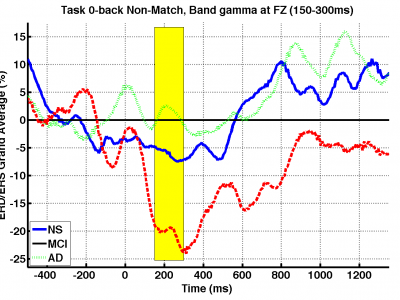Documents
Presentation Slides
EVENT-RELATED SYNCHRONISATION RESPONSES TO N-BACK MEMORY TASKS DISCRIMINATE BETWEEN HEALTHY AGEING, MILD COGNITIVE IMPAIRMENT, AND MILD ALZHEIMER’S DISEASE

- Citation Author(s):
- Submitted by:
- Francisco Fraga...
- Last updated:
- 2 March 2017 - 7:08am
- Document Type:
- Presentation Slides
- Document Year:
- 2017
- Event:
- Presenters:
- Francisco J. Fraga
- Paper Code:
- 3050
- Categories:
- Log in to post comments
In this study we investigate whether or not event-related (de)synchronisation (ERD/ERS) can be used to differenti- ate between 27 healthy elderly, 21 subjects diagnosed with amnestic mild cognitive impairment (aMCI) and 16 mild Alzheimer’s disease (AD) patients. Using 32-channel EEG recordings, we measured ERD responses to a three-level vi- sual N-back task (N = 0, 1, 2) on the well-known delta, theta, alpha, beta and gamma bands. Our findings revealed that healthy elderly (HE) elicited consistently greater beta and alpha ERD responses than MCI and AD patients at many scalp electrodes, most of them located at fronto-central and temporal-parietal areas. Additionally, significant ERD dif- ferences were found on the gamma band in the MCI vs. AD comparison. Based on these findings, we conclude that ERD responses to a working memory (N-back) task could be useful for early MCI diagnosis or for improved AD diagnosis, and also for assessing the likelihood of MCI progression to AD.
Index Terms— working memory, event-related (de)synchronisation, mild cognitive impairment, Alzheimer’s disease

